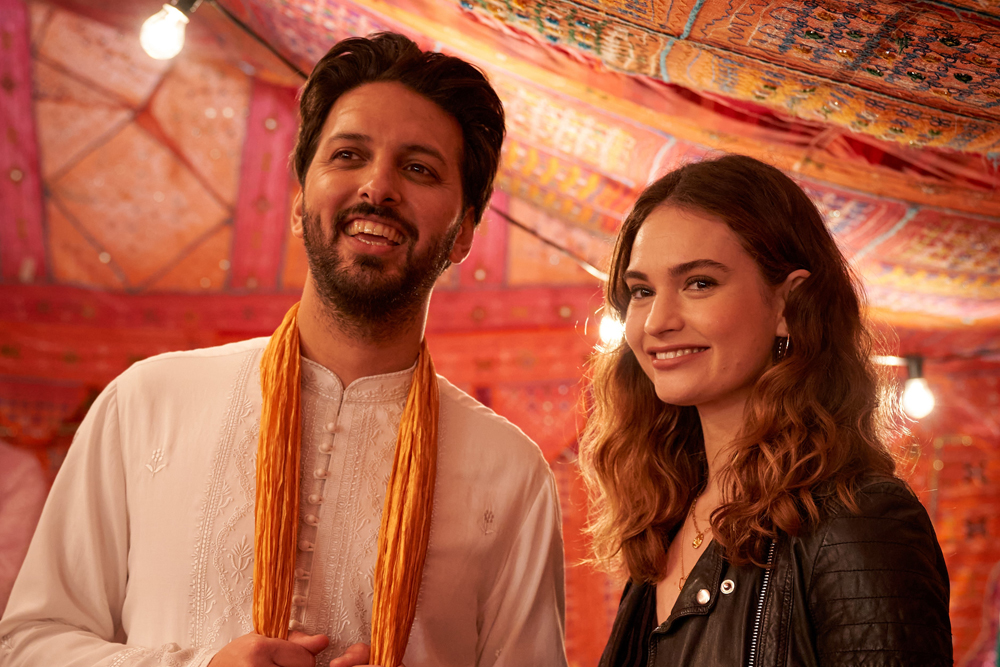After rising to international prominence with his 1994 barnburner “Bandit Queen” about the Indian folk hero Phoolan Devi, Shekhar Kapur had seized the opportunity to tell the kind of grand scale historical epics that few could since the days of David Lean, going on a run that would include Cate Blanchett’s coming out party “Elizabeth” and its sequel “The Golden Age” and an adaptation of A.E.W. Mason’s war drama “The Four Feathers,” but when it came to colors they inevitably sported an amber tint, denoting the story’s setting in another era. When Kapur found the first feature script in 14 years that he wanted to direct, “What’s Love Got to Do With It?” a contemporary romantic comedy penned by Jemima Khan, it wasn’t only an opportunity to show off his comedy chops that hadn’t been highlighted since directing the wildly popular Bollywood love story “Mr. India” in 1987, but to broaden his color palette with the bold reds, greens and yellows he was excited to mix together.
“I just sometimes feel I can’t live without them,” Kapur said recently.”You know, life is contradictory and everything comes out of contradiction, so clashing colors, clashing words, clashing images — somewhere in those clashes, life exists, and therefore I love the idea of the clash of senses because the chaos of life actually exists in that.”
No wonder then that Kapur was attracted to the clash at the heart of “What’s Love Got to Do With It,” where the perils of modern dating leads Kaz (Shezad Latif), an eligible bachelor to embrace the tradition of his Pakistani heritage and offer himself up for an arranged marriage. His childhood friend Zoe (Lily James) certainly is surprised but also slightly envious when her own search for a partner by swiping right on various apps hasn’t gone any better, and as a documentary filmmaker looking for a subject she can sell to producers, she asks if she can join Kaz during his courtship in which his family needs to approve a bride, a process that may relieve the awkwardness of a long search feeling out a potential mate for their compatibility, but introduces a host of other considerations as his mother (Shabana Azmi) and father (Jeff Mirza) weigh in after all but excommunicating his sister Yasmin (Iman Boujelouah) for rejecting the idea in her own life.
All the matchmaking may not play out according to plan on screen in “What’s Love Got to Do With It,” but Kapur brings a zest to the material that suggests he’s been waiting for the right moment to dip into the genre for some time, bringing a bit of Lahore to London (quite literally as it turns out) with the flavorful comedy that sees Zoe and Kaz travel across continents once the latter makes plans to marry and plays out with all the pomp and circumstance of the big day with the energy packed into every frame well before reaching the altar. After premiering at last year’s Toronto Film Festival, the film is rolling into theaters this week and Kapur kindly spoke about his triumphant return to the feature filmmaking after a decade away, making a pressure-filled shoot during COVID work for the benefit of the film and finding unique ways to bring the back-and-forth between longtime friends James and Latif to the screen.
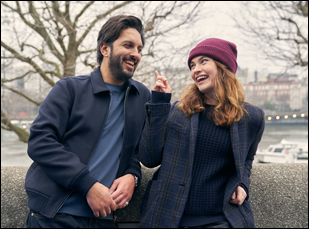
And then [Shazad Latif’s character] Kazim is confronted with this and said, “I know exactly what I’m doing and you should also know what you’re doing,” but then it turns [out], maybe he doesn’t know what he’s doing because that is the nature of love. It’s a mystery and it’s a sense of discovery and it’s a sense of longing and yearning. Mystery is love, so everybody says “I know that’s it and the day you say I know, love’s over, so a lot of choice lies in this way of searching for love and that’s what drove me. Since the beginning of the human race, that’s been our main search.
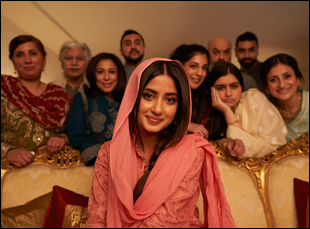
Yeah, I think naturally that I would give that line. And we all knew that the film was going to be very entertaining, but we also knew that when it comes to most of the scenes, they had to be real. Because the performances were so real, that’s one way we got away with it, and I spent a lot of time with the actors trying to find out how they felt. Lily James spent a lot of time trying to find Zoe in herself — not that she found who she was, [but] where was that Zoe sitting in her? Same with Shabana Azmi playing Aisha or [Shazad] playing Kaz, and then of course the brilliant Emma Thompson [who plays Zoe’s mother], she also found the way through that. I don’t think there was a big effort into making this into what we call a rom-com, but the rom-com emerged from the way the characters were. In a romcom, okay, there’s always a chase to the airport and in the end, it all ends with a little ribbon on the top and this film doesn’t do that. It brings you to a point where you decide where you live in this film — it doesn’t matter whether you’re Chinese or English — every culture has that and whichever culture or your life experience lies, you decide who you are and how you are in this film and that’s what I liked.
Speaking of real, I understand Pakiza Baig, who plays Kaz’s grandmother Nani Jan is a nonprofessional who is actually the real-life mother of Jeff Mirza, Kaz’s father in the film. How did that come about?
Well, we didn’t know because the lady that was going to play Nani Jan suddenly couldn’t do it, so we asked around and Jeff said, “Oh, I know someone.” And suddenly he brought his mother, [but] we didn’t know that. It was a complete secret. And she was amazing. And it’s funny that when I did my first cast and crew screening, the number of people that came up from all kinds of cultures and said, “My God, my grandmother’s just like that.” She obviously became a character that everybody knew from their own lives, whichever culture you came from.
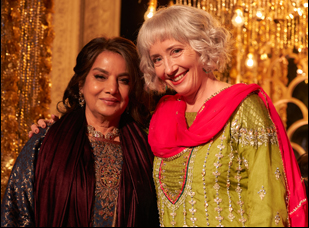
One day I was in Lily’s house somewhere in the coast, and we were supposed to rehearse, but I said, “What are you guys doing?” [And Shazad] said, “We’re playing table tennis,” and that’s when [an idea for a scene] struck me, and back into our offices, I set up a table tennis table and [the two of them] were just rehearsing many scenes and we were playing table tennis because to see how it works. Then suddenly in one scene, they are playing table tennis [as they debate the merits of an arranged marriage] and everybody said, “Hang on, there’s no table tennis table at that part of London.” I said, “Who cares? It’s a movie,” so they’re playing table tennis in that.
It’s a remarkable scene because they keep the ball in the air for so long in every possible way. Did it require a lot of takes?
Yeah, and obviously if you have a long dialogue scene, it takes the serious edge off. It just makes it more playful.
I hope I’m not ruining the movie magic by asking, but when this was all filmed in London, how did you end up recreating the sequences set in Lahore?
I was hoping nobody would ask that, but of course the cat’s out of the bag now. I can tell you one little interesting incident that when I was doing “Golden Age,” the second bit of “Elizabeth,” I went to a small little 13th or 14th century church in the middle of the city, where I shot the execution of Mary of Scots, and [the one in “What’s Love Got to Do With It?”] Is the same church that I used and turned into the exterior of the Lahore streets, so it’s movie magic, but it’s just the way you put the camera, the way you light it, and once again, the performances. If you believe the performances, you believe everything else.
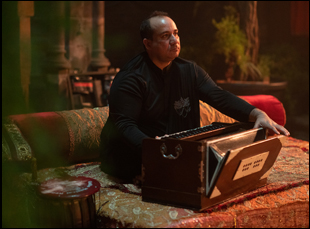
I’ve known Rahat since he was a kid because I did “Bandit Queen” with his uncle, the great Nusrat Fateh Ali Khan, who did the music and sang and I used [Rahat] earlier in a film that I did called “Four Feathers,” so I’ve known him a long time now and I said, “Listen, you have to be in the film” and he’s just a marvelous performer. That experience was amazing and people just notice him. He just has this passion that he delivers in the way he’s singing and you can see that passion reflected as Sufi love in the main characters as they’re listening to him. You can just see it in Lily’s eyes, how moved she is by it.
The wedding seems like an immense production unto itself with the Bollywood number. Was that exciting to choreograph?
Very exciting. I love doing it. And if you’ve seen my films in India, I just love doing those big, big, big numbers. If I had a choice, every film I do would be musical because music and dance is an essence of life to me. And don’t forget that we were shooting this film in the middle of COVID in London and people were dying in ambulances at that time, so in a way, I knew that every day that I had to shoot this film was a day gifted to me to shoot. I had to become more instinctual and the actors had to become more instinctual, so, in that push, we did everything from our heart and it’s not like I had the opportunity to sit back and say, “Hmm, how am I going to do the shot?” It was just straight from the hip, so I think all that made it a better film.
With an abbreviated schedule like that, was there anything that came out of thinking on your feet you could be excited by?
Well, it makes the actors think on their feet too and in that moment, when everybody’s thinking on their feet, it’s like going to war. Everybody gets more coordinated and gets into the same [rhythm] because nobody [stops to say], “Well, I don’t actually agree with you.” You just get into it and through the chaos, creativity arises. I’m not saying that there were no disagreements, but as I said to Jemima [Khan], who wrote the script, “You know what? Remember that if two highly creative people are always agreeing, one of them is lying.”
“What’s Love Got to Do With It?” opens in limited release on May 5th.




